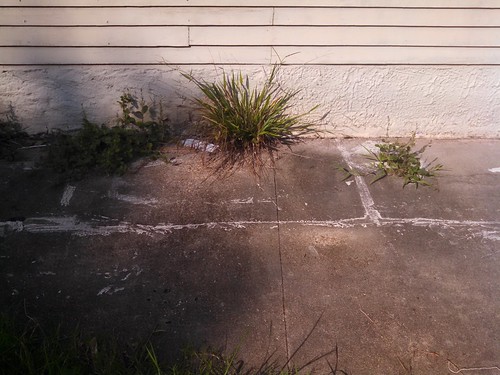
It says "Help." Or, at least it did once. This is a sidewalk I pass over every day. Sometimes I still stop to wonder who needed help here. I've been thinking about it constantly this week because, well, how can one not? The national spotlight has burned hot on New Orleans this week. It has, for worse and for better, illuminated some of the fading markers of our trauma like this message in the sidewalk here.
To us it is jarring. Not because we've "put Katrina behind us" even if some people do make that assertion. How could we, though? It defines everything about what's become of us since. But because we've lived with its scar so long, we've come to understand that it is just a part of our body now. It's still with us. We've just grown accustomed to having it. The attention this week has caused us to feel it in a way we might not have in a while.
We're not reacting well to that. How could we? The uncomprehending scrutiny of the world outside combines with the avalanche of official bullshit from city leaders to create an echo of that time after the flood when we felt abandoned or betrayed by an entire system at all levels. So while everything this week seems like it is about us, none of it is really for us.
Our friend Adrastos captured much of this anxiety earlier in the week in a widely distributed post he wrote for First Draft.
People have been in a very tetchy mood here all month. It’s made worse by all the disaster tourist journalists and carpetbloggers popping into town, taking our temperature, and putting their own spin on our story. That makes it their story, not ours. Once again, we live it every day, they’re just drive-by Katrina experts. Go bug somebody else and leave us alone.
Can you see it here? Look closely.
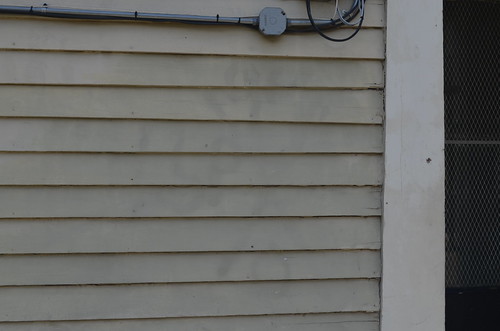
I took that photo this week. There's a search and rescue mark on that wall. You might not know if you aren't looking for it. Here. I'll show you same wall in June 2006.
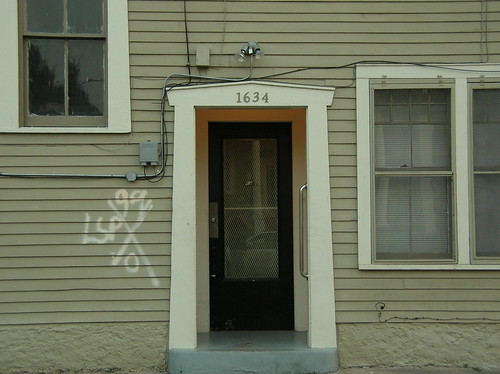
If you've been reading this week, you'll know I've made a project of revisiting the sites of old photos and reshooting them. Here's the link to all of those posts. This post will be one of them too.
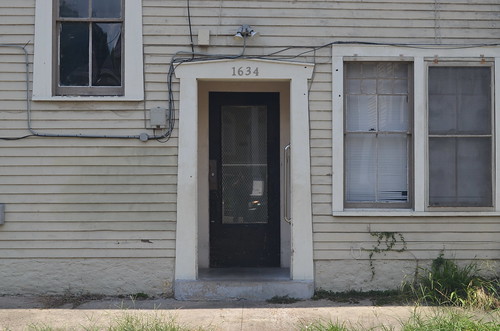
When I started to write about revisiting the rescue marks, I realized after a while that I had already written a post like this last year. At that time also I was thinking about what the experience of the flood still meant to those of us who lived through the recovery.
Katrina and the flood have formed an indelible mark on our lives. It is the palimpsest upon which every story about our city today is written. Nine years later, it is impossible to understand anything happening in New Orleans without talking about how that thing was made possible or necessary by Katrina.So while the flood isn't the first thing on everyone's mind these days, you don't get too far into explaining anything without dealing with the fact of it in some way. After this week, I'm sure we'll declare it's been put to bed entirely. This will not really be true. But in some ways I expect it will feel so. And this can be for the better or for the worse.
Here is something Troy Gilbert posted earlier this month that got my attention. It's a previously unpublished interview with Chef Greg Picolo about his post-Katrina experiences. There's a paragraph toward the end where Picolo talks about how the flood changed his outlook on civic life to a degree.
Asked how he was changed by the entire experience, the Chef answers quickly, “That Greg doesn’t live here anymore. Before I led a very monastic lifestyle. I kind of broke out of the tunnel vision I had before. Today, I have more of a need to connect with people. I needed to lose some of my control. I’m easier going. I have zero patience for bullshit, and now I just don’t get bogged down with stuff.”I'm certain I am not alone in saying this really hits home. It might be the common denominator of everyone's experience rebuilding New Orleans. When we got back, we were shaken out of our silos. Each of us in some small way at least had to look around to see who our neighbors were. Who else was here? Who could help? How could we help them? Entire new networks were stitched together out of parts that just weren't possible to bring together before.
I wonder, though, if ten years later, we're starting to sink, bit by bit, back into our own tunnel visions of life in a new New Orleans. As we put the recovery "behind us" is receding from the tighter cross sectional communities we built during that process a good idea? Why might this be important?
Well, for one thing, let's take a look at who does and doesn't think New Orleans has recovered.
According to a survey released Monday by the Manship School of Mass Communication’s Reilly Center for Media and Public Affairs at LSU, nearly 80 percent of white residents in New Orleans think the state has mostly recovered.So that's uncomfortable. At a time when the calendar tells us it might be okay to close the book on "recovery" we're finding that the work is not all done. President Obama said as much during his visit Thursday.
But three in five black residents — 59 percent — say it hasn’t.
“White and African-American residents of New Orleans tend to see the past decade in very different ways,” said professor Michael Henderson, who directed the survey. “Most white residents think life in New Orleans is better today — not simply better than the toughest times that followed Hurricane Katrina, but better than it was before the storm even arrived. Most African-American residents do not feel that way.”
So we've made a lot of progress over the past 10 years. You've made a lot of progress. That gives us hope. But it doesn't allow for complacency. It doesn't mean we can rest. Our work here won't be done when almost 40 percent of children still live in poverty in this city. That's not a finished job. That's not a full recovery. Our work won't be done when a typical black household earns half the income of white households in this city. The work is not done yet.I worry that the class and racial divide in our perceptions of recovery is allowing some of us to sink back into complacency. I worry that even though we've learned to live with the fact of our altered reality, we are in danger of losing its lesson through active denialism.
Our work is not done when there's still too many people who have yet to find good, affordable housing, and too many people -- especially African American men -- who can't find a job. Not when there are still too many people who haven't been able to come back home; folks who, around the country, every day, live the words sung by Louis Armstrong, "Do you know what it means to miss New Orleans?"
Former Times Picayune reporter John McQuaid wrote about this on Medium today.
America is an optimistic nation. It has a short memory. Our political system and media don’t really learn very obvious lessons that unspool right in front of everyone’s faces. And so we end up repeating our errors — at least, some of them — to great sorrow.Memories, even the painful ones, are what make us who we are.
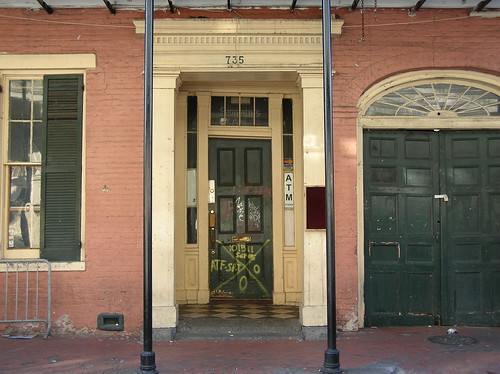
Eradicating their marks might be an act of optimism. But it can also be a willful negligence of a more chronic condition. Out of sight. Out of mind.
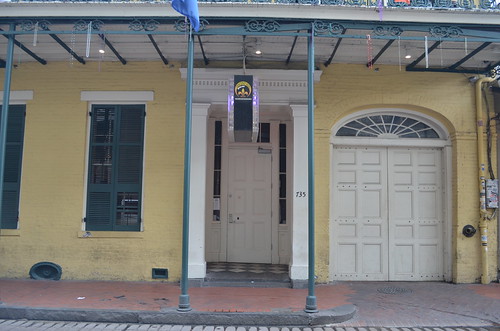
But it would be a greater mistake to lose the expanded sense of community that helped us help ourselves these past 10 years.
On Thursday night, Black Lives Matter co-founder Alicia Garza spoke to a full house at the Ashe center. The subversive power of active community networks was a major theme of her speech.
Garza ran down a list of threats to black lives — blasting neo-liberals, the “racist blowback” of President Barack Obama’s election and reelection and subsequent “bursting of the Obama bubble,” the national affordable housing crisis, climate change, gentrification and the literal threats of violence (and many deaths) of blacks at the hands of white police officers. “The crisis in the Gulf Coast didn’t start when the levees broke,” she said. “Levees have been breaking for black people for a long time now.”When I heard Garza's speech I took the distinction between "solidarity" and "radical conspiracy and collaboration" to mean the difference between passively receiving a benign official definition of community and actively stretching beyond those limits to create stronger connections.
Recovery, then, should include a radical shift of power — an economic, social and political transformation, she said. Black people should seek new forms of power and learn to wield and execute it differently “than those who oppress us” while abandoning “solidarity” and instead taking on “radical conspiracy and collaboration.”
I also thought about the city's summer long promotion of the term "Resilience" and how impotent the celebration of that buzzword was compared with the countless citizen directed networks and actions that sprouted up in the wake of the flood. If we lose momentum; if we retreat from those participatory actions and rest on our "resilience" we will move in a direction opposite to what Garza is calling for.
Rather than responding to President Obama's call to finish the work of recovery, we are in danger of sliding into complacency. Because we are not Kristen McQueary, we should not want to wait for another Katrina to shake us out of that rut. In the next ten years, if we're going to help each other, we're going to have to keep shaking each other awake. And to do that, we'll have to remember some unpleasant things.
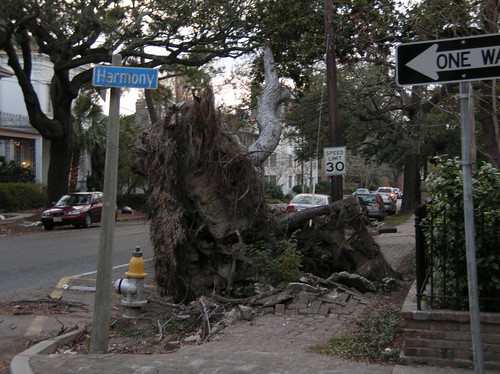
Even if we don't always see them in front of us.
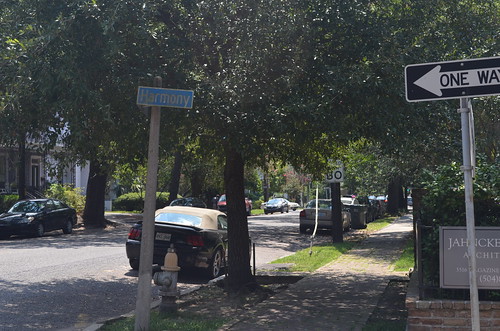
No comments:
Post a Comment